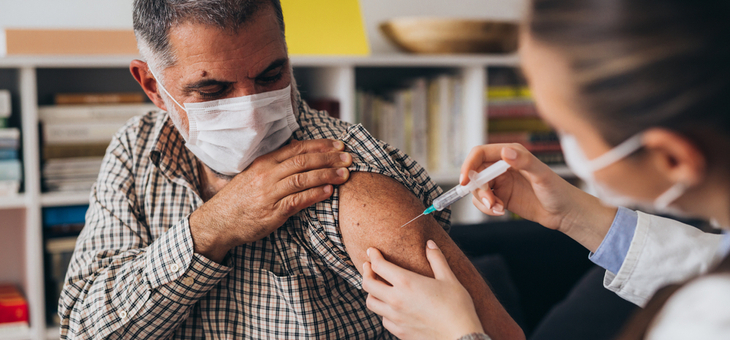A global study has called for older people to be prioritised for COVID-19 vaccinations.
The University of Colorado Boulder paper, published in the journal Science, says “vaccinating older adults for COVID-19 first will save substantially more US lives than prioritising other age groups, and the slower the vaccine rollout and more widespread the virus, the more critical it is to bring them to the front of the line”.
The study drew on demographic information from different countries, as well as data on how many people have already tested positive for COVID-19, how quickly the virus is spreading, how fast vaccines are rolling out and their estimated efficacy.
It modelled what would happen in five scenarios in which different groups were vaccinated first: children and teenagers; adults aged 20 to 49; adults aged 20 or older; adults 60 or older, and a situation where anyone who wanted a vaccine got one until supplies were exhausted.
In most scenarios, across countries, prioritising adults 60-plus saved the most lives.
“Age is the strongest predictor of vulnerability,” said senior author Daniel Larremore, a computational biologist in the University of Colorado’s Department of Computer Science and BioFrontiers Institute.
“You have an exponentially higher likelihood of dying from COVID-19 as you get older.
“Common sense would suggest you want to protect the older, most vulnerable people in the population first. But common sense also suggests you want to first protect frontline essential workers (like grocery store clerks and teachers) who are at higher risk of exposure,” said Assistant Professor Larremore.
“When common sense leads you in two different directions, math can help you decide.”
Most Western countries appear to be inoculating frontline workers first, then the elderly.
However, Indonesia plans to prioritise working age adults over the elderly, aiming to reach herd immunity quickly to revive its economy.
“I don’t think anybody can get too dogmatic about what is the right approach,” Peter Collignon, professor of infectious diseases at Australian National University, told the World Economic forum website. He said Indonesia’s strategy could slow the spread of the disease, although it may not affect mortality rates.
“Indonesia doing it different to the US and Europe is of value, because it will tell us (whether) you’ll see a more dramatic effect in Indonesia than Europe or US because of the strategy they’re doing, but I don’t think anybody knows the answer.”
Indonesia says it does not yet have enough data of the vaccine’s efficacy on elderly people, as its clinical trials are using people aged 18-59.
Science Daily reports that researchers don’t yet know how well vaccinations block infection and transmission.
“If they don’t block it well and asymptomatic spreaders abound, it again makes the most sense to vaccinate older adults. If nothing else, they’ll be personally protected against grave disease.
“Only in scenarios where the virus is under control and the vaccine is known to block infection and transmission well does it make sense to move younger adults to the front of the line.”
Prof. Larremore says his research suggests that prioritising people who have not yet had COVID might allow hard-hit communities to “stretch first doses further” and possibly get some benefits of herd immunity effects sooner.
“To allow the vaccine to get to folks before the virus does, we need to not only roll out the vaccine quickly and get it to the most vulnerable people, we have to also keep our foot on the virus brake with masks, distancing, and smart policies,” he said.
Kylie Quinn from RMIT University’s School of Health and Biomedical Sciences says there are several reasons why older people should be next in line after frontline COVID workers are dosed.
“First, older people are bearing the brunt of severe disease from COVID. In Australia, nearly half of severe cases requiring intensive care, and more than 90 per cent of deaths, have been people over 65.
“Second, a potential vaccine may not protect as well in older people, but it should protect to a degree. As an example, the flu vaccine provides 60-70 per cent protection in the general community, dropping to 30-40 per cent protection in people over 65 – but even at that rate it’s still protecting a substantial number of older people.
“Third, where a potential vaccine doesn’t prevent infection, it could still reduce severe disease. For example, in one study, the flu vaccine reduced the rate of severe disease in vaccinated people regardless of age group.
“A modest improvement in cases or severe disease in older people could have a big impact on the overall burden of disease and death.”
World Health Organization chief director-general Tedros Adhanom Ghebreyesus has slammed drug makers and governments for vaccination policies that leave poor nations behind.
“It’s right that all governments want to prioritise vaccinating their own health workers and older people first,” he said.
“But it’s not right that younger, healthier adults in rich countries are vaccinated before health workers and older people in poorer countries. There will be enough vaccine for everyone.
“We now face the real danger that even as vaccines bring hope to some, they become another brick in the wall of inequality between the world’s haves and have-nots.”
Who do you believe should be vaccinated first? Are you confident that the vaccines will prove effective?
If you enjoy our content, don’t keep it to yourself. Share our free eNews with your friends and encourage them to sign up.
Related articles:
https://www.yourlifechoices.com.au/travel/will-you-need-a-vaccination-to-visit-australian-venues
https://www.yourlifechoices.com.au/health/covid19/aussies-much-more-willing-to-be-vaccinated-than-americans
https://www.yourlifechoices.com.au/health/covid19/poll-reveals-support-for-vaccinations-and-compulsory-masks

